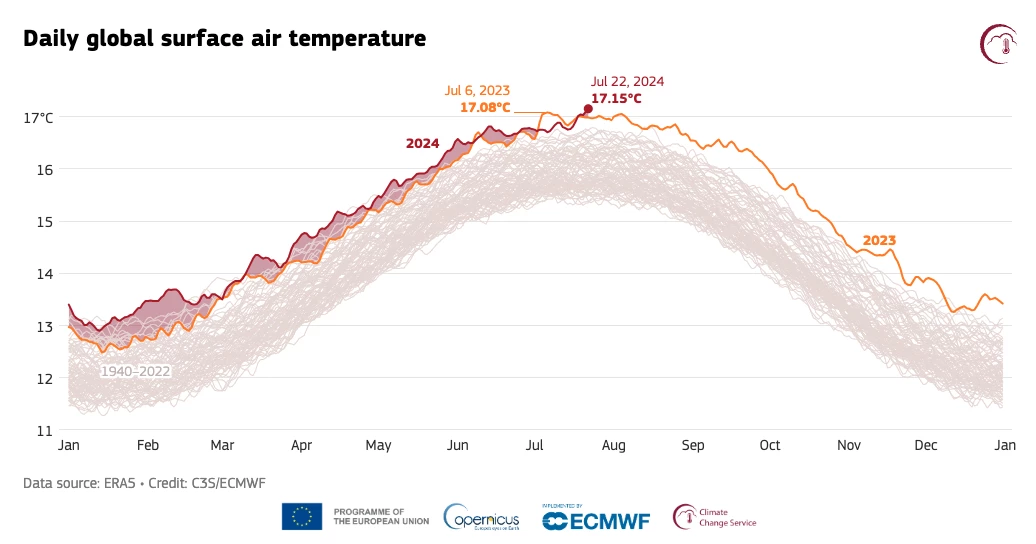Earth saw its hottest day on record this week – twice. According to the Copernicus Climate Change Service (C3S) data, Sunday claimed the top spot for highest global average temperature since the records began in 1940, only to be broken again on Monday.
On Sunday July 21, the global average surface air temperature peaked at 17.09 °C (62.76 °F), just edging past the previous record of 17.08 °C (62.74 °F) set on July 6 last year. The record didn’t stand for long though – the very next day, Monday July 22, the mercury spiked to 17.15 °C (62.87 °F).
It’s important to note that this is according to preliminary data in one specific dataset, ERA5, as collected by the C3S as part of the European Union’s Copernicus program. The variation between datasets, some of which have recorded even higher temperatures, comes down to differences in where that data is gathered and how it’s processed.
Specific differences aside, these datasets tend to agree on the wider trends, which not only show a long-term increase in average temperature, but that the years 2023 and 2024 are leading by quite a margin.
For instance, prior to last July the previous record for highest daily average temperature was 16.8 °C (62.24 °F), set on August 13, 2016. But after standing for almost seven years, that record has now been broken almost 60 times since mid-2023.
“This new report of a daily global average temperature record is noteworthy because we are no longer in an El Niño warm phase and it has occurred during an extended period of extraordinary heat – June 2024 was the thirteenth month in a row of record-breaking global temperatures,” said Chris Hewitt, Director of Climate Services at the World Meteorological Organization (WMO).

Unsurprisingly, 2024 is tracking to have a good chance of being the hottest year on record, a title currently held by 2023. The first half of this year has consistently been warmer than the corresponding period last year, but the last four months of 2023 were so abnormally warm that it’s not yet clear whether 2024 will match it, especially with a La Niña phase likely. Either way, this year will comfortably slot into the top 5.
“What is truly staggering is how large the difference is between the temperature of the last 13 months and the previous temperature records,” said Carlo Buontempo, C3S Director. “We are now in truly uncharted territory and as the climate keeps warming, we are bound to see new records being broken in future months and years.”
And yes, before a certain type of person rushes to the comments to point out that Earth has been much hotter in the past, and the climate has changed drastically many times before: we know. That's why these findings are always stated in terms like "on record." But longer-term studies suggest we may not have seen sustained periods of temperatures this high in around 125,000 years, and times of rapid climate change are usually punctuated with mass extinctions, like the one we're starting to see now.
So yes, life itself is impressively resilient, and Earth will probably continue being inhabited by some form of it until the Sun blows up. But it'd be nice if we could help humans could stick around a bit longer.
Sources: Copernicus, WMO





